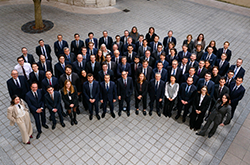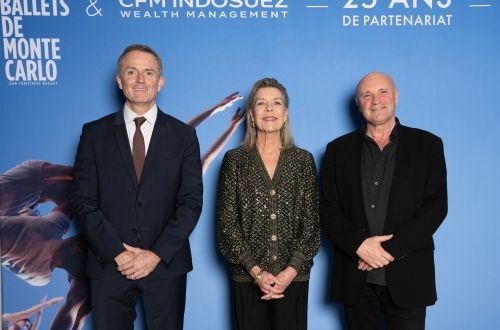Conference on the future of the airline industry
The Covid-19 pandemic has caused major disruption to the lives of people throughout the globe. Industries and businesses have been brought to a complete standstill while battle weary governments are cautiously picking up the pieces of a battered economy and social fabric.
This pandemic has brought about new realities worldwide; leaving a resounding message that adaptability and agility are the only ways to overcome this unprecedented storm.
As architects of wealth, Indosuez Wealth Management is committed to keeping clients abreast with the latest trends and insights, not just in within financial markets but also across various socio-economic and geo-political landscapes. In an inaugural two-part virtual series titled “A Brave New World”, hosted by Indosuez in Asia, clients from around the world were invited to hear from two distinguished speakers on key topics surrounding the evolving mindsets and practices that are required to overcome this crisis. The series highlights a keynote presentation by the speaker on their experience, takeaways and outlook of this pandemic, before diving into an interactive discussion and Q&A session facilitated by Omar Shokur, CEO, Asia.
The first part of the series featured Tony Fernandes, Founder and Group CEO of the largest leading low-cost airline in Asia, who shared about his experience and outlook on the future of the what could arguably be one of the hardest hit industries, the travel and hospitality industry.
The second part of the series takes place on 18 November and will headline Helen Clark, former Prime Minister of New Zealand and now Co-Chair of the Independent Pandemic Panel for Pandemic Preparedness and Response (IPPR) who will be examining the effects of the pandemic on the interactions of businesses and individuals at institutional and societal levels.
A look back at key messages from Part One – The Future of Travel and Hospitality by Tony Fernandes:
Keys to success
In the early 2000s, Malaysian businessman Tony Fernandes, who had worked for Virgin Group and Time Warner, bought AirAsia, an ailing airline company for a token USD 25 cents.
With two planes, 245 employees and the singular objective of democratising air travel, Tony Fernandes decided to re-launch the airline under the brand of “AirAsia”, featuring only the name of the airline in red for more visibility in the air.
In less than two decades, AirAsia has transported 91 million passengers to 160 destinations on 380 routes. Fernandes attributes this success to three main factors:
- The quality of his teams who are determined and motivated, allowing them to overcome the various crises and challenges. "We have always rewarded merit, promoted diversity and supported the career of each of our employees so that everyone can progress. Their satisfaction is a key element of our momentum and success," said the CEO.
- Creating a favourable environment for innovation and risk-taking for employees.
- Transparency towards employees and customers. "It is essential to keep our promises, to be as transparent as possible even when the situation is difficult by using all media to communicate. We have set up an internal chat system that has been working effectively for 18 years and that all employees use to share information quickly and directly." stated Tony Fernandes.
As a result, AirAsia has not only become one of the strongest aviation brands, but also offers a real capacity for innovation, allowing it to maintain its position in the market as one of the leading brands in low-cost carriers. Cementing its position in the global market, it won Skytrax’s “World’s Best Low Cost Carrier” for 11 consecutive years beating other popular American and European brands. AirAsia has also made a name for itself in Europe as a major investor in the London football club Queens Park Rangers.
A future to build
In Asia, tangible signs of recovery are beginning to emerge and the company has already recouped close to 85% of its pre-crisis activity. Despite the persistent fears from certain customer segments, particularly the elderly, the appeal of air transport remains. However, this dynamic is entirely widespread and will continue to vary from country to country according to whether borders are open.
Fernandes remains optimistic, highlighting that this is a significant time of transformation for the sector; notably for the low-cost carrier companies, which will be driven by the resumption of leisure travel once the health restrictions have been eased. Nevertheless, he explains that it is expected that long-haul flights would become less attractive in favour of closer and neighbouring destinations.
"With fewer and fewer business trips, probably over shorter distances, airlines will inevitably have to reinvent their business class offerings. It is also an opportunity for them to consider a post-Covid world under the sign of leisure from 2022 onwards. However, the timing will depend on our collective ability to defeat the virus," says Tony Fernandes.
He recalls launching the AirAsia brand just before the September 11th attacks, a grim year for the aviation sector which saw a host of new security standards that were quickly adopted. This time around it is health restrictions and sanitary regulations that require adjustments in the protocols for welcoming and transporting passengers. Nevertheless, the company head remains confident in the sector's ability to adapt.
Combining digitalisation and diversification
Fernandes has always placed a particular focus on the digitalisation of his company and the protection of the data of his 900,000 customers. 90% of ticket bookings are made direct on the company's website which has evolved to become a central portal which offers its customers direct access to a full suite of services including financial services and even bank loans. In addition to its airline business, the group now offers logistics services in a number of areas including food and fresh produce delivery, as well as retail travel services. An attractive loyalty programme has also helped to build and maintain customer loyalty.
With a decorated career in the world of aviation and hospitality, Fernandes has overcome an array of crises’ of multiple origins (September 11th attacks, the Eyjafjöll eruption in the south of Iceland, the SARS epidemic etc...). The current pandemic however has presented an unprecedented international character.
Nonetheless, Fernandes remains optimistic and believes that his group and staff will be able to adapt with agility by building on the brand’s strengths and diversification; the range of meals prepared in a central kitchen and offered on board his aircraft, in his restaurants or delivered to his customers is just one example among many.
He concluded by saying that one should never underestimate a situation and that even if the current environment is unprecedented, one should remain positive and find reasons to be happy because, "we will come out of this even stronger".
November 17, 2020




